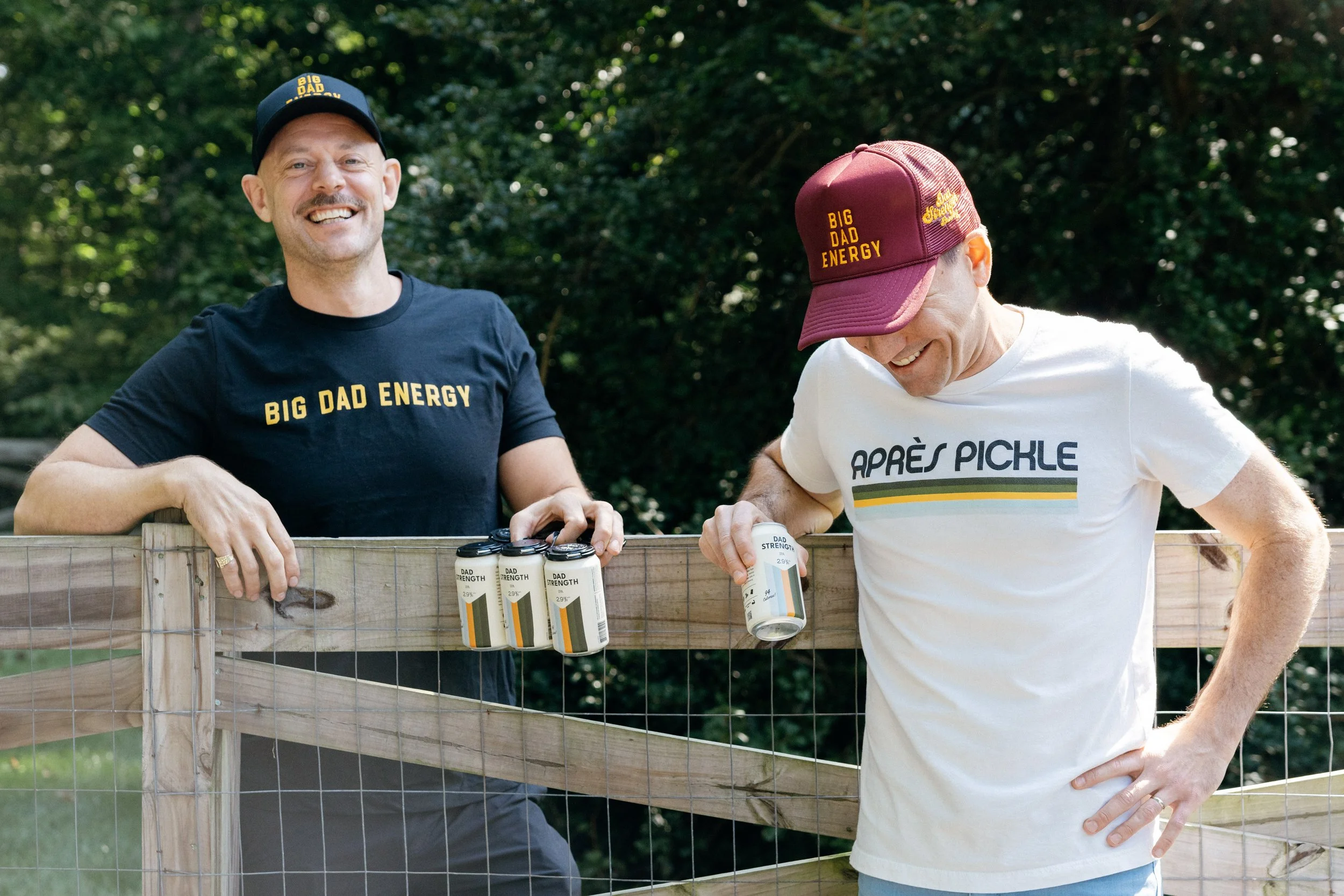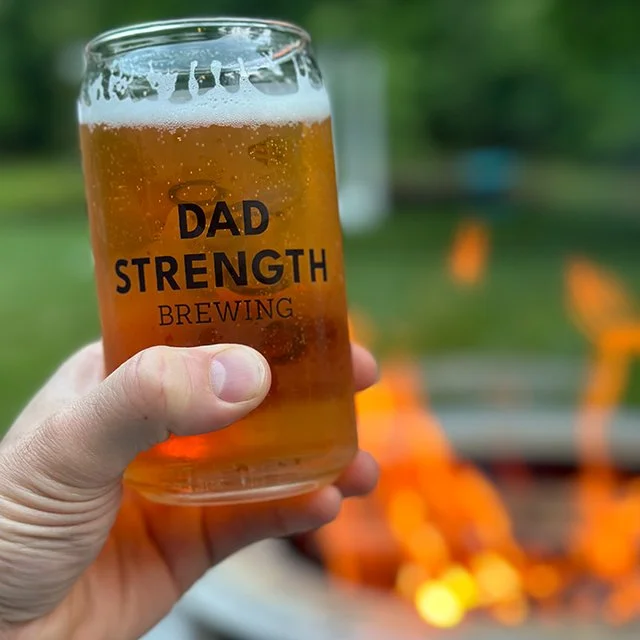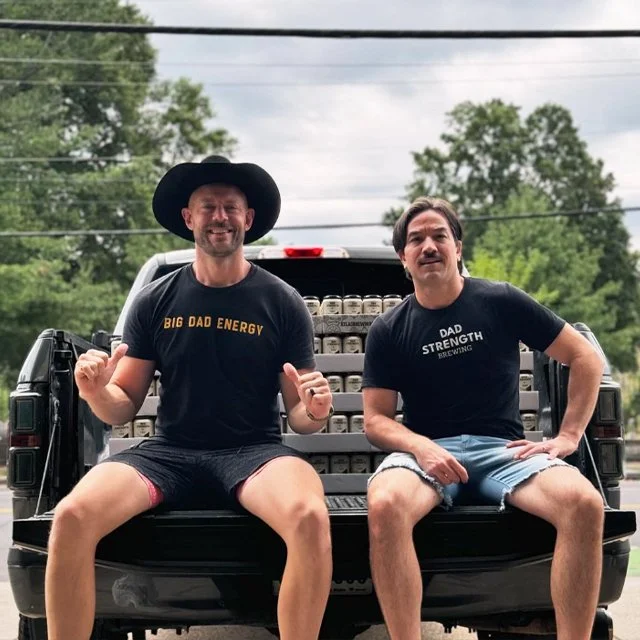Dad Strength Brewing's Co-Founder Craig on Low-ABV Beer Innovation in Washington DC
Craig & Ryan are tried and true entrepreneurs. Craig built and ran restaurants around the greater DMV for well over a decade and Ryan, after stints working for some of the largest advertising agencies in the world, opened his own agency Circus Maximus running campaigns for brands like La Colombe, Crest, Hu Chocolate, Shake Shack, Icelandic Provisions and Angry Orchard.
Ryan and Craig are both IPA fans but as they got older they started to realize that having a few 7+% IPAs on a Saturday was a little more painful on Sunday morning than it used to be. To help, they started mixing nonalcoholic beer with their favorite IPA’s to create a lower-ABV blend. Eventually, after recognizing that their problem might be a bit more universal than they thought they reached out to their old friends at Atlas Brew Works to see if they could try and create something different. After a lot of testing they finally found the right formula to maintain the full flavor of an IPA with a lower ABV (2.9%), creating a crushable beer that’s perfect in any number of situations.
What started as a passion project has turned into Dad Strength, a brewing company that offers low ABV beers that taste great without the hangover.
When we talk to people about Washington DC, most don’t think of the city as a breeding ground for product entrepreneurs - we hear about New York or Chicago for food & beverage and of course San Francisco for tech. We wanted to highlight two people that are building a long term sustainable business right here in The District just like Jenna from Whisked or Yao from 50 Hertz. Creating a product is incredibly hard and doing it the right way without cutting corners is even more challenging. We had the chance to chat with Craig, one of the co-founders, about building Dad Strength, how think about raising money, and the future of the business.
This interview has been lightly edited for conciseness and clarity.
Craig, thanks for taking the time to chat between sales calls. Let’s just start with how you found your way to DC originally!
I grew up in Northern Virginia and then stayed in Virginia for college. My Dad lived in Arlington and my Mom lived out in the suburbs. It wasn’t until 2009 after graduating college that my girlfriend and I moved into the city. We lived in Shaw for about a decade and still live in the DMV. Ryan, my co-founder is based in the Union Market area today.
Dad Strength is a concept that I haven’t seen in the market before. The idea of a low ABV beer is really intriguing and you have already gotten some great press from places like Axios. Help me understand how you and Ryan decided to start the business together.
Ryan and I have both been entrepreneurs for quite a while and did some work together prior to starting Dad Strength. We weren’t sitting there saying that we wanted to do something in beer and trying to figure out what that was. Instead, this was a problem that we both had. I had been mixing craft beer with nonalcoholic beer. I loved beer and was trying to figure out how to not give up something I loved. It turns out Ryan was mixing beers too. We were just frustrated that you could find a beer around 8% or a light beer around 5% and then it went to 0%. We couldn’t find anything in the 0-3% space that we liked.
At a certain point we got fed up enough that we started talking to brewers. I had worked with Atlas Brew Works for years on some online and email marketing so we reached out. I think Atlas does an amazing job putting out an exceptional number of beers in a wide variety of categories and they really take the time to make sure each product is great before it gets launched. When we started we weren’t sure that we could make a 2.9% ABV beer under 100 calories that actually tasted good. Atlas more than rose to the challenge. The nice thing is that Atlas isn’t just our brewer they are also our product development team. Their team has nailed a West Coast IPA, a Juicy IPA and are working on the next one.
“We weren’t sitting there saying that we wanted to do something in beer and trying to figure out what that was. Instead, this was a problem that we both had.”
My understanding is that running a beer business can be really tough because you often have to work through a distributor which can be really expensive for a young brand. What has been your biggest challenge so far?
Washington DC is really unique for starting a beer business. Alcohol laws here are unique in that DC allows you to self distribute. In the beginning all we wanted to do was prove that this was a problem that other people had. DC was perfect because we could drive around in a pickup, walk into a store, and see if we could get the store owner to sample our beer. We spent a lot of time tasting and introducing people to the brand and received a lot of early positive signals. People were super enthusiastic and we found people who had all of these uses for this beer. People talked about it for post pickleball beer, happy hour beer, or as a Monday Night Football beer.
So what did that early growth look like? You have made that move from being purely local to being on the shelf at some big grocery stores like Safeway and Whole Foods.
Sales started picking up for us quickly. We had mailed some of the product down to the Whole Foods team based in Austin and about a month after that they reached out saying they had brought it on a team retreat, really enjoyed it, and were going to authorize us to sell in DC There are 8 Whole Foods here which is a really high number for such a small geographic area. Getting into Whole Foods was a major step for us because our volume (amount of sales) started to become interesting to a distributor. It’s a bit of a chicken and egg situation where a distributor doesn’t want to work for a small brand until you get big enough but oftentimes to become big enough you have to have a distributor.
I think we learned quickly that there was significant overlap between the Whole Foods customer and what we were offering. Dad Strength products have half the alcohol of a normal beer and we know that people are adjusting their relationship with alcohol. Whole Foods customers have really supported us and we have supported them right back by launching almost weekly sampling programs in stores around the region.
From there, we used that to find a distributor and then leveraged the fact that we had a distributor and were in Whole Foods to expand into Giant, Trader Joe’s and Safeway. Getting into Safeway was a big win for us since they moved us out of the DMV for the first time and into Virginia. We opened up VA a month and a half ago and we’ve had some huge wins since then with Harris Teeter and Wegmans.
Everything right now is about proving out the concept market by market which aligns very much with who Ryan and I are as entrepreneurs. We really believe in going a mile deep and an inch wide and making sure we are successful in a place before we move forward. We focused exclusively in DC for our first 8 months in market. Both of us were standing in an independent beer/wine/liquor store or a Streets Market every weekend trying to introduce people to our product. We think DC is in a really good place and we are constantly in touch with all of our supplier partners in the DMV. Not a week goes by where I’m not in DC meeting with some of our retailers or customers.
You were in the restaurant business before this, how does it compare? Harder or easier?
I mean it’s all really hard. To be an entrepreneur you have to be incredibly obsessed with solving the problem. I tell everyone that’s considering starting something that they should be prepared for 10 years of just grinding. In the case of Dad Strength we had a problem and we desperately wanted to create a solution for ourselves. That’s a real recipe for success in the beginning but the truth is that it’s hard. But, if you love what you’re doing and building it’s incredibly rewarding. At the end of the day it kind of reminds me of being a Dad where the days are long but the years fly by. I have a 2 and a 5 year old and I look back and it feels like everything has moved so quickly.
Let’s talk about your own co-founder dynamic. How do you and Ryan balance responsibilities?
We both consider ourselves entrepreneurs which is a fancy word for a salesperson. When I was trying to open my restaurant nobody would lend money or invest since before opening a restaurant I had been in digital marketing. Now people look at me as a restaurant guy and they don’t see me as anything else. We break our business into buckets - there is a marketing, product, finance and sales function. Under finance for example we have compliance and accounting. Under marketing we have everything from social media to out of home (our tasting team). We are big believers that between us two each person should take point on a bucket but we both need to know what happens. Ryan takes point on social media and I take point on financial projections and accounting and then we update each other on our work on three times a week.
One thing that is super clear is that both of your responsibilities include weekly tastings, why is that such a focus for you?
Almost all of our marketing spend goes towards tastings. We have spent a lot of time and energy building systems and tasting materials to make sure that we have a tasting team that can go out and really get people to engage with our brand. We hire people we call “Dadbassadors” who are customers that reached out to us, love and use our product, and are the type of fan that can really speak to why someone should try it.
For Ryan and myself, we’ve each personally poured over 10,000 samples of Dad Strength and still spend a lot of our time out sampling with customers or consumers.
“For Ryan and myself, we’ve each personally poured over 10,000 samples of Dad Strength”
What are the highs and lows of running Dad Strength?
I love all of it - I love taking something from a problem to a solution and putting it out into the market and then finding other people who share the same problem and enjoy the same product. That said, the thing that isn’t discussed enough about entrepreneurship is how lonely it can be. There are highs and lows and I spend a lot of time surrounding myself with people who are incredibly supportive. That is Ryan as a business partner but also my wife who has been amazing throughout this process.
A good example of how some of the lows can pop up is something I experienced today. We do really well at the Whole Foods in DC, we have good momentum and good relationships with all the buyers. But today, when I was sampling at a Whole Foods in a new region we are exploring, the two buyers just weren’t enthusiastic about we were doing. Maybe I wasn’t on my A game or in the right mood and driving home I was just reflecting that you have to prove yourself day in and day out and it takes a lot of resilience to trust the process and just continue to get out there and talk to people about your product.
There are a lot of competing opinions on raising money to scale. I think there are some really successful examples of entrepreneurs who raised a lot of money and did well and some other examples where they raised a lot of money but never proved product market fit and ended up growing too quickly then losing it all. Do you and Ryan have a philosophy around raising money?
We have chosen to stay totally independent and take no outside capital. I think taking money too early can sometimes do a disservice to the brand in the sense that you don’t figure out how to solve real problems since you can throw money at it. For us, we also didn’t want the stress/strain that taking money can do because it shortens the time horizon to figure things out. Before we considered any fundraising we wanted to be 100% confident that we have product market fit. We’ve had a lot of people come to us and want to invest but so far we haven’t moved forward with that process.
We both left our full time jobs in March so we’re fully in. As part of that we recognize that there’s only so long you can go with just us two working on the brand without doing something to help it scale. We’d like to expand further around the country and I think at that point we’ll look at what type of investment we need to make that happen.
A lot of entrepreneurs look at raising money as the win in and of itself. I have a different approach because for me the name of the game is to hold on to as much of your company as possible. When it comes time to raise capital you need to find the right partners who have skillsets that complement your own to turbocharge the company. We want to make sure it’s the right people at the right time and not just raising money to raise money.
Ryan still lives in DC and you started your business here. I’m curious how you think DC could better support entrepreneurs since you are living it day to day.
I think that there needs to be a dead simple way to start a business in D.C.. Statistically speaking, most startups are not going to be successful so making it really difficult to start a business just makes it harder for people to go out and try new things. I’m not saying there shouldn’t be safety regulations, especially for something like beer where people are consuming the product, but I think the city should really focus on removing the complications. I have an almost endless number of reports every month that get as granular as focusing on how many cases I’m selling into individual counties. Anything that can be done to make things simple and easy to get a business to the 1 year mark would be incredibly. Giving people the chance to try things and innovate. We need to make it easier for people to take risks and try things.
“I think that there needs to be a dead simple way to start a business in D.C.”
Let’s talk about the beer itself. You’ve launched a few IPA’s, what’s next in the lineup?
First, our brewing team is phenomenal. They deserve a ton of the credit here. They are World Beer Cup medal winning and I don’t think we can say enough about how great Daniel has been. We launched an IPA because that was where the biggest problem for us was out of the gate. There are a lot of IPA’s that are high ABV so there was a lot of opportunity there. Creating the product wasn’t easy, it took a year. The breakthrough was ultimately just running a lot of different experiments to learn how to control the residual sugars. We went with a West Coast IPA for our second product again because it’s Ryan and my favorite style. Out thinking is that if the business was going to fail at least we could make the exact beer we wanted for us out of the gate. When we went through the process of tasting with people not everyone liked a slightly more bitter West Coast IPA, which is why we created the super fruit forward Juicy IPA. Then since we had figured it out we went through the process of developing and launching a hazy IPA. Following that people have started to ask for a non-IPA so we’ve started working on what we call project not-IPA. I can’t speak to the science but we have our first pilot coming up for a crisp ale. We think it’ll take a little while and it better be 100% super delicious before we bring it to market but we’re really excited about that product.
I’m looking forward to tasting the newest Dad Strength beer, appreciate the time Craig!



